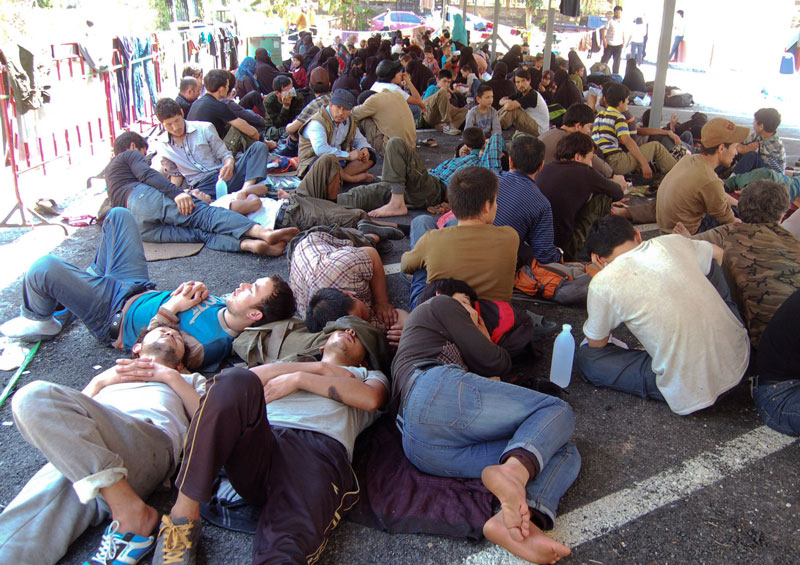
For immediate release
November 19, 2014 3:45pm EST
Contact: Uyghur American Association +1 (202) 478 1920
The Uyghur American Association (UAA) is concerned over the fate of over four hundred refugees held in Thailand after remarks by Thai Deputy Prime Minister and Defense Minister, Prawit Wongsuwon.
Quoted in the Bangkok Post on November 18, 2014, Prawit Wongsuwon said: “About their [the Uyghur refugees'] safety, I do not believe a superpower like China will treat them with violence when these people return home.”
The remark followed a November 17, 2014 Bangkok Post report of a comment made by the Chinese consul in Songkhla, the same province where many of the Uyghurs are being held, that the refugees “should be repatriated.” The Chinese consul also rejected any “concerns they will be mistreated” upon return.
UAA reminds the Thai authorities that under the principle of non-refoulement, contained in Article 3 of the United Nations Convention against Torture (CAT), the Uyghurs should not be deported to China, as they face the high probability of persecution given China’s documented mistreatment of returned Uyghurs in the past. Thailand ratified CAT on October 2, 2007 and an op-ed published in the Bangkok Post on November 19, 2014 describes Thailand’s history of respect for the principle of non-refoulement.
UAA also believes it is the responsibility of the United Nations High Commission on Refugees (UNHCR) and the moral duty of the United States and other democratic governments to help the Uyghurs refugees by urging the Thai government to respect the principle of non-refoulement in regard to the Uyghur cases.
“We are very concerned about the Uyghur refugees in Thailand, among them many women and children. These people left China because they wanted to flee their oppressors and to seek freedom and respect for human rights. To return the Uyghurs to China would not only contravene international principles, but also destroy the trust these people placed in the international community,” said UAA president, Alim Seytoff in a statement from Washington, DC. “Past precedents of deporting Uyghur refugees from Southeast Asia to China have proven that no Uyghur refugee is safe from Chinese persecution upon extradition.”
Mr. Seytoff added: “The escalation of repression in East Turkestan under Xi Jinping has reached a point where Uyghurs who escape China are in need of a systemic approach to guarantee their safety and rights. Governments should resist Chinese pressure and enticements to return Uyghurs under an international framework to manage refugee issues, as more cases appear to be happening.”
The issue of the Uyghur refugees in Thailand came to light again after reports described how some of them had disappeared from shelters in southern Thailand. Citing a Thai official in a report dated November 18, 2014, the New York Times said over 120 refugees remained missing and 21 had been found. The article also said the missing Uyghurs were “almost all” women and children.
A November 17, 2014 report by Radio Free Asia quoted an interview with one of the Uyghurs who had fled the shelter. The refugee said health concerns and bad conditions had prompted the Uyghurs to escape; however, the presence of “Chinese agents” at the shelter threatening to return the refugees to China had led many to decide on leaving the facility.
A New York Times report dated March 24, 2014 claimed there were 409 Uyghur refugees in Thailand whose presence can be accounted for. A March 24 report in the Phuket Wan put the total at “about 410.” According to the New York Times report, 220 Uyghurs were found on March 12 at a human trafficking camp in Songkhla province near the Thai-Malay border; then, a further 77 were detained also in Songkhla province and 112 were detained in Sa Kaeo Province near the Thai-Cambodian border. However, the Phuket Wan put the number detained in the second group at 78 Uyghurs in a March 21 article.
Uyghurs have in recent years been forced to flee severe political, economic and social repression in East Turkestan, as well as institutionalized curbs on the freedom of speech and government efforts to criminalize the expression of Uyghurs’ religious and cultural identity. Since July 2009, many Uyghurs have fled China due to harsh persecution that has been carried out in the wake of unrest that began on July 5, 2009 in the regional capital of Urumchi.
Uyghurs have been deported from Southeast Asian nations susceptible to Chinese economic and diplomatic pressure in the past. Six Uyghurs were forcibly removed from Malaysia in December 2013; 11 Uyghurs from Malaysia in August 2011 (one of whom was a legal resident according to local Uyghurs); one Uyghur from Thailand in August 2011; seven from Laos in March 2010; 17 from Burma in January 2010; 20 Uyghurs from Cambodia in December 2009 (one of whom had a Cambodian visa); two from Vietnam on an unknown date; and 11 from Vietnam in April 2014. A Uyghur returned to China from Vietnam in 2014 died in prison in Guangxi “under mysterious circumstances” while serving a 11-month sentence for “illegal travel.”
According to a January 26, 2012 report from Radio Free Asia, two Uyghurs deported from Cambodia to China, Nurahmet Kudret and Islam Urayim, were handed life sentences after closed trials. It is unclear when the two men were sentenced, or of what charges they had been convicted. Islam Urayim reportedly witnessed security forces killing and beating Uyghur demonstrators on July 5, 2009 in Urumchi. A third Uyghur deported from Cambodia, Musa Muhammad received a 17-year jail term, also on unknown charges. Of that group of deportees, the other seventeen remain unaccounted for.
A Radio Free Asia report published on December 20, 2012, described how one of the Uyghurs deported from Malaysia in August 2011 was imprisoned for three years on “separatism” charges following a closed trial. According to the report other Uyghurs deported at the same time had been jailed for up to 15 years; however, Radio Free Asia could not confirm the sentences.
